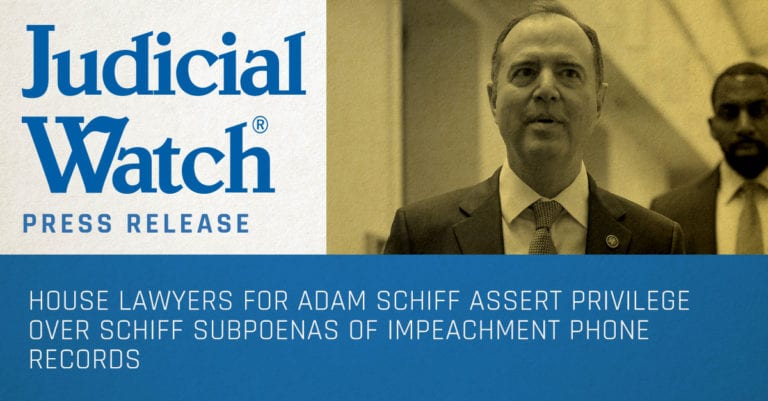
Judicial Watch: House Lawyers for Adam Schiff Assert Privilege over Schiff Subpoenas of Impeachment Phone Records

Schiff published private phone records of Rudy Giuliani, Devin Nunes, Journalist John Solomon
(Washington, DC) – Judicial Watch announced today that Representative Adam Schiff (D-CA) and the U.S. House Permanent Select Committee on Intelligence asked the U.S. District Court for the District of Columbia to dismiss the lawsuit against them for the controversial impeachment-related subpoenas for phone records, including those of Rudy Giuliani, President Trump’s lawyer. Schiff and the Committee are being represented by the Office of General Counsel for the House of Representatives.
The phone records led to the publication of the private phone records of Giuliani, Congressman Devin Nunes, journalist John Solomon, Trump attorney Jay Sekulow, attorney Victoria Toensing, and other American citizens.
In their 14-page motion Schiff and the Committee claim “sovereign immunity;” “Speech or Debate Clause” privilege; immunity from FOIA and transparency law; that the records are secret; and that Judicial Watch and public do not need to see them.
Judicial Watch filed its lawsuit under the public’s common-law right of public access to examine government records after it received no response to a December 6, 2019, records request (Judicial Watch v. v Adam Schiff and U.S. House Permanent Select Committee on Intelligence (No. 1:19-03790)):
- All subpoenas issued by the House Permanent Select Committee on Intelligence on or about September 30, 2019 to any telecommunications provider including, but not limited to AT&T, Inc., for all records of telephone calls of any individuals
- All responses received to the above subpoenas.
Schiff is a member of the U.S. House of Representatives, currently serving as chairman of the United States House Permanent Select Committee on Intelligence. Schiff is being sued in his capacity as Chairman of that committee. The lawsuit states:
The records are of critical public importance as the subpoenas were issued without any lawful basis and violated the rights of numerous private citizens.
Disclosure of the requested records would serve the public interest by providing information about the unlawful issuance of the subpoenas.
The requested records fall within the scope of the public’s right of access to governmental records as a matter of federal common law.
“Schiff’s new court filing to try to avoid disclosing his abusive subpoenas of confidential phone records suggests he and Congress can secretly subpoena and publish the phone records of any American with zero accountability under law to the people,” stated Judicial Watch President Tom Fitton. “Speaker Pelosi and every House member should be asked if they agree that they are above the law and can spy on any American.”
###
















